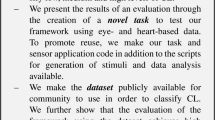Abstract
More and more technological advances offer new paradigms for training, allowing novel forms of teaching and learning to be devised. A widely accepted prediction is that computing will move to the background, weaving itself into the fabric of our everyday living spaces and projecting the human user into the foreground. This forecast turns out to be an opportunity for human-computer interaction as a way to monitor and assess the user’s stress levels during high-risk tasks. The main effects of stress are increased physiological arousal, somatic complaints, mood disturbances (anxiety, fear and anger) and diminished quality of working life (e.g. reduced job satisfaction). To mitigate these problems, it is necessary to detect stressful users and apply coping measures to manage stress. Human-computer interaction could be improved by having machines naturally monitor their users’ stress, in a non-invasive and non-intrusive way. This article discusses the development of a random forest classifier with the goal of enabling the assessment of high school students’ stress during academic exams, through the analysis of mouse behaviour and decision-making patterns.
Access this chapter
Tax calculation will be finalised at checkout
Purchases are for personal use only
Similar content being viewed by others
References
Cohen, S., Kamarck, T., Mermelstein, R.: A global measure of perceived stress. J. Health Soc. Behav. 24(4), 385–396 (1983)
Dahlin, M., Joneborg, N., Runeson, B.: Stress and depression among medical students: a cross-sectional study. Med. Educ. 39(6), 594–604 (2005)
Gonçalves, F., Carneiro, D., Novais, P., Pêgo, J.: EUStress: a human behaviour analysis system for monitoring and assessing stress during exams, pp. 137–147. Springer, Cham (2018). https://doi.org/10.1007/978-3-319-66379-1_13
Horowitz, M., Wilner, N., Alvarez, W.: Impact of event scale: a measure of subjective stress. Psychosom. Med. 41(3), 209–218 (1979)
Kohavi, R., et al.: A study of cross-validation and bootstrap for accuracy estimation and model selection. In: IJCAI, vol. 14, Montreal, Canada, pp. 1137–1145 (1995)
Kranner, I., Minibayeva, F.V., Beckett, R.P., Seal, C.E.: What is stress? Concepts, definitions and applications in seed science. New Phytol. 188(3), 655–673 (2010)
Lloyd, C., Gartrell, N.K.: Psychiatric symptoms in medical students. Compr. Psychiatry 25(6), 552–565 (1984)
Pais Ribeiro, J., Marques, T.: A avaliação do stresse: a propósito de um estudo de adaptação da escala de percepção de stresse. Psicol. Saúde Doenças 10(2), 237–248 (2009)
Peacock, E.J., Wong, P.T.P.: The stress appraisal measure (SAM): a multidimensional approach to cognitive appraisal. Stress and Health 6(3), 227–236 (1990)
Shah, M., Hasan, S., Malik, S., Sreeramareddy, C.T.: Perceived stress, sources and severity of stress among medical undergraduates in a Pakistani medical school. BMC Med. Educ. 10(1), 2 (2010)
Acknowledgements
This work is part-funded by ERDF–European Regional Development Fund and by National Funds through the FCT–Portuguese Foundation for Science and Technology within project NORTE-01-0247-FEDER-017832. The work of Filipe Gonçalves is supported by a FCT grant with the reference ICVS-BI-2016-005.
Author information
Authors and Affiliations
Corresponding author
Editor information
Editors and Affiliations
Rights and permissions
Copyright information
© 2019 Springer Nature Switzerland AG
About this paper
Cite this paper
Gonçalves, F., Carneiro, D., Pêgo, J., Novais, P. (2019). Monitoring Mental Stress Through Mouse Behaviour and Decision-Making Patterns. In: Novais, P., et al. Ambient Intelligence – Software and Applications –, 9th International Symposium on Ambient Intelligence. ISAmI2018 2018. Advances in Intelligent Systems and Computing, vol 806. Springer, Cham. https://doi.org/10.1007/978-3-030-01746-0_5
Download citation
DOI: https://doi.org/10.1007/978-3-030-01746-0_5
Published:
Publisher Name: Springer, Cham
Print ISBN: 978-3-030-01745-3
Online ISBN: 978-3-030-01746-0
eBook Packages: Intelligent Technologies and RoboticsIntelligent Technologies and Robotics (R0)




